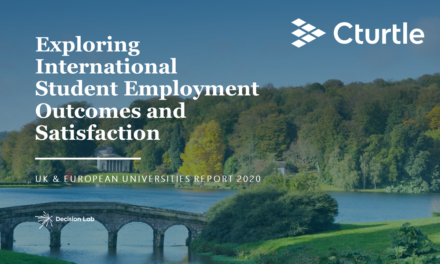Prospects’ head of higher education intelligence, Charlie Ball, provides his regular update on the impact of the COVID-19 recession on the graduate labour market
What we’re hearing
- The new lockdown is a very serious blow to many businesses, but especially to SMEs and to retail, hospitality and the arts.
- Most projections of economic recovery did not assume a second lockdown of this nature. Those that did suggest that the UK will not get back to where it was in February until 2022 at the earliest. This means that the 2021 recruitment round is now likely to be down.
- The level of vacancies is running at somewhere around two thirds of normal rates and seemed to be climbing – slowly.
- Graduate training schemes are down but probably not as much as most of the rest of the market.
- It looks like there’ll be a two-track recovery (US economists are calling it ‘K-shaped’, with some sectors, particularly those where remote working is effective, recovering rapidly and others slowly. As most of the rapidly-recovering sectors are highly graduate this may exacerbate the already serious social and economic divides in the country.
- Things are also looking difficult for the self-employed, partly because a lot work in sectors, such as the arts, that have been badly affected and partly due to sheer lack of cash reserves – although the sector has been more resilient than originally feared.
- Formal and conventional internships as we knew them pre-pandemic are down but employers are trying to find alternatives and there is likely to be quite a diverse and innovative set of work experience offers.
- Apprenticeships have been hit hard in SMEs but seem to be recovering in larger businesses.
- A lot of employers are adopting virtual recruitment strategies which are likely to stick post-pandemic.
- The collapse in employment in retail and services is likely to affect term-time jobs for students in the future and thus the ability for students from less advantaged backgrounds to support themselves at university.
- The pandemic is going to profoundly change the nature of work for many employees, and professional services and IT workers in particular have proved as productive at home as in the office, so a widespread move to homeworking is likely for many graduates. The large majority of workers in tech and professional services are currently working from home, and if this pattern persists it will significantly change many aspects of society, particularly in our cities.
- London seems to be taking a particular hit, with footfall and vacancies well below normal levels. It remains a very strong graduate economy though.
- Many of the big graduate training schemes are in the process of enacting plans for their 2021 recruitment round. At present we are hearing of some pauses, but they seem to be the minority at the moment – that said, this was before a second lockdown was announced. A reasonable view of the 2021 round right now is that it may be down on a normal year but better than the 2020 round.
“One-in-five workers in the most deprived places were not working or still furloughed at the beginning of September.“
This week’s news and reports
England will enter a month-long lockdown on Thursday. From 5 November, the public should only leave home for specific reasons, including going to work (if they cannot work from home), attending medical appointments and shopping for essential goods.
- Restrictions will remain in place until 2 December.
- Non-essential shops, leisure and entertainment venues will close.
- Pubs, bars and restaurants have to close, except for takeaway and delivery services.
- Nurseries, schools, colleges and universities will remain open.
- People can only mix with one person from another household outdoors.
- The furlough scheme will be extended to December – although many furloughed workers have already been laid off by businesses anticipating the end of the scheme in October.
People Management continue their liveblog on employer actions in the pandemic.
The ONS have the latest instalment of their rapid experimental statistics on the social impact of COVID-19 to 29 October:
- The proportion of British adults who worked from home increased to 29%, the highest since July.
- Total online job adverts increased to 70% of their 2019 average.
- Healthcare and social care jobs are now running at above their 2019 average – although there may be a seasonal component to this.
- The East Midlands is now at 89% of its 2019 average, and the North East at 88%. London remains the region with the lowest volume of job at 57% of its 2019 average volume.
The Resolution Foundation have released this report, called ‘Jobs, jobs, jobs’. It is about jobs.
Specifically, it’s about the effect pandemic has had on workers, using the results of a survey of 6,000 working age adults that took place in September. There’s a lot in this report, but here are some key findings:
- Unemployment is rising most among the young.
- Rising unemployment is mainly driven by low flows into work rather than job exits.
- One-in-five workers in the most deprived places were not working or still furloughed at the beginning of September, but more than one-in-four of these workers live in London.
- Workers furloughed in lockdown were around twice as likely as other workers to no longer be working by September, with young workers the most affected.
- Respondents who reported losing their job between February and September were disproportionately likely to have been on an insecure contract. 13% of workers reporting being on an insecure contract in February are no longer working, and a further 22% have had a pay cut.
- At the height of the lockdown in April, 30% of self-employed workers had stopped working – by September this had fallen to 17%. More than a quarter of 18-34-year-olds in self-employment have stopped working
- Most people whose job ended during the crisis are still out of work.
- Respondents from coronavirus-affected sectors are still looking for work in those sectors.
King’s Business School have issued research reporting on a survey of 350 entrepreneurs to gauge the views of the self-employed.
- 49% of entrepreneurs were planning for the next 12 months only and 53% predicted that they would run out of money within the next 12 months if the current situation continued.
- Entrepreneurs frequently struggled with cancelled or postponed orders and receiving payments and found it challenging to pay suppliers and their business’s running costs.
- Only 19% of SME employers had been forced to lay off staff. 45% of SMEs in the sample had applied for the Coronavirus Job Retention scheme, though younger companies that could not demonstrate a two-year-plus revenue track record were excluded.
- Women-led businesses were impacted more adversely than those of men with 72% (vs. 56%) seeing their businesses experiencing lower trading volume.
- Some entrepreneurs also anticipated an acceleration of their existing business, often tied to online services, with 16% of female entrepreneurs and 7% of male entrepreneurs expanding into online trading as a result of the pandemic. Others saw cost savings from increased remote working
- 44% of entrepreneurs had volunteered their business’ services or products for good causes and half of those who donated time or products did so as a result of the pandemic.
- 61% reported that the existence of their business was under threat due to a significant decrease in trading activities. Kings estimate that this puts potentially 16.6 million UK jobs at risk if entrepreneurs cannot sustain their businesses
The chief economist of the Bank of England, Andy Haldane, gave a speech looking at the impact COVID-19 has had on the way people work in the UK and what prolonged homeworking might mean for people’s wellbeing and the economy.
Haldane discusses many of the pros and cons of homeworking and expresses concerns that while working from home for a prolonged period appears to have made workers materially happier, and more empowered in the workplace, it could also be stifling creativity and professional development. Haldane neatly encapsulates many of the ongoing discussions around these questions – as yet, we have no clear answer to them.
“During lockdown, nearly three quarters (74%) of private school pupils benefitted from full school days, against 38% of state school pupils.“
Professor Lee Elliott Major of Exeter University, and Andrew Eyles and Professor Stephen Machin of the Centre for Economic Performance at the LSE, have authored an important paper Generation COVID: Emerging Work and Education Inequalities, which presents initial findings from the first LSE-CEP Social Mobility Survey. This was undertaken in September and October, with a particular focus placed on work and education inequalities of 16 to 25-year-olds. The authors give this cohort the title ‘Generation COVID’.
- Generation COVID were over twice as likely as older employees to have suffered job loss.
- Over one-in-ten lost their job.
- Just under six in ten saw their earnings fall.
- Labour market losses are more pronounced for women, the self-employed and those who grew up in a poor family.
- University students from the lowest income backgrounds lost 52% of their normal teaching hours as a result of lockdown, but those from the highest income groups suffered a loss of 40%.
- Female students were far more likely than males to report that the pandemic had adversely affected their wellbeing.
- During lockdown, nearly three quarters (74%) of private school pupils benefitted from full school days, against 38% of state school pupils.
- A quarter of pupils had no schooling or tutoring during lockdown.
The Recruitment and Employer Confederation, REC, have released their monthly Jobs Outlook in conjunction with Savanta ComRes, looking at hiring intentions in September.
- Confidence in the UK economy as a whole remained very low, but confidence in making hiring decisions had improved.
- Permanent hiring intentions rose to a net: +13 in the short term and a net: +17 in the medium term.
- 29% of employers were concerned about finding a shortage of suitable candidates for permanent roles, this rose to 34% for health and social care roles.
- 35% of employers reported having no spare capacity in their workforce this quarter, rising to 43% among medium-sized employers (50-249 employees).
The ESRC-funded Economics Observatory have updated several of their labour market briefings. They include:
- The prospects of young people entering the labour market now
- The effects of graduating in a pandemic on graduate lifetime earnings
- How can we prevent the pandemic scarring young people’s career prospects?
Among the findings were:
- Graduates finishing their degrees in a recession are more likely to suffer lower earnings due to lower wages and fewer hours of work at entry. The effects last up to 10 to 15 years.
- The impact on people’s living standards is smaller, due to the tax and benefit system and income provided by other household members, mainly parents .
- Non-graduate leavers who enter the labour market during a recession suffer even larger long-term earnings losses than graduates and the effects are felt more in terms of employment than wages.
- The damaging effects of entering the labour market in a recession may extend beyond economic outcomes, having a negative impact on marriage, divorce, fertility and, in the very long run, even mortality.
- The effects on graduate earnings depend on people’s individual characteristics. They are larger for those already predicted to have lower wages and for those graduating in subjects that are associated with slower wage growth over subsequent careers.
- The effects may also differ according to family background, with evidence indicating the widening of socio-economic gaps in earnings among UK graduates entering the labour market during the 2008/09 recession.
- The crisis is likely to affect the low skilled more severely. Even among graduates, those with lower skill levels, or skills that are not in strong demand in the labour market, will fare worse.
- Career progression for these cohorts is likely to be affected, with less opportunity to progress to higher skilled and better-paid jobs.
- A likely response to the crisis will be for young people to try to remain in education longer. For example, graduates may continue on to postgraduate study. This will be more feasible for those from families with greater socio-economic advantages, who can better support their children to do this, thereby further exacerbating inequality (assuming that postgraduate study actually confers career advantage).
Another of the briefings, How will different regions of the UK be affected by pandemic, found:
- There are large differences in economic performance and wellbeing both between and within areas of the UK.
- The impact of the crisis is likely to differ across local areas, due to differences in the direct health burden, industrial composition and skill composition of places.
- Establishing the relative importance of these and other factors is problematic, and therefore predicting how areas will be affected is difficult. But disadvantaged households and areas are likely to be hardest hit.
And lastly, How the pandemic and lockdown might affect social mobility:
- In the wake of the 2008/09 global financial crisis, absolute mobility in the UK declined. Wages are lower than they were a decade ago, while living costs are at historic highs.
- Relative income mobility – the extent to which children’s adult earnings are independent of their parents’ earnings – has also decreased over time in the UK.
- There is a stronger relationship between the earnings of parents and their children in the UK than in any other developed economy apart from the United States.
- Some evidence suggests that recessions strengthen this relationship, particularly for disadvantaged families most at risk of suffering job losses during an economic downturn.
Finally, Robin Mellors-Bourne of CRAC and Tristram Hooley of the ISE have released a research report following a study of graduates from the leading performing arts schools within the Conservatoire for Dance and Drama: ‘It helps to have more strings to your bow’: Exploring the careers and success of graduates of the Conservatoire for Dance and Drama’. A full write-up of the findings will appear on Luminate shortly.
Written by Charlie Ball
Source Prospects Luminate
Like this? Read more other interesting topics HERE






Recent Comments